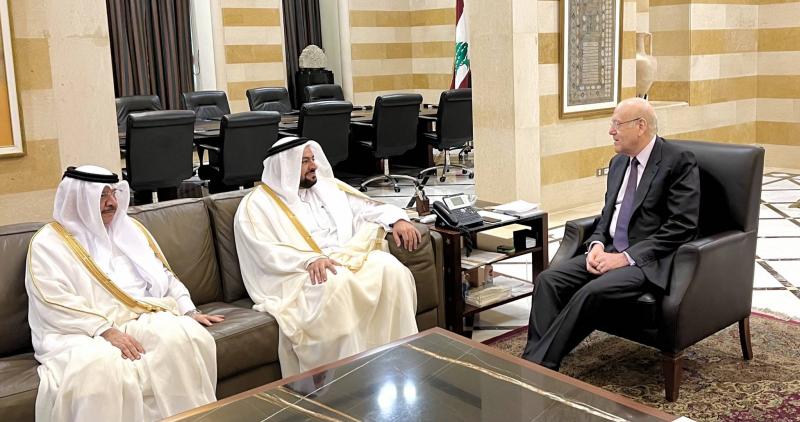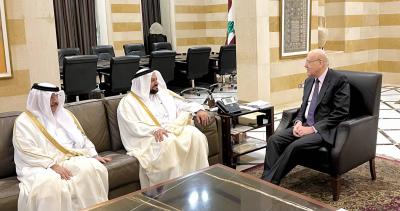Kamal Zbeidan
Qatar has not been absent from Lebanon, neither politically nor financially nor economically, especially in providing assistance after the Israeli aggression on Lebanon in the summer of 2006. It was among the countries that helped rebuild what was destroyed, particularly in the southern suburbs and Bint Jbeil, where the significant Qatari contributions led to the "Resistance Axis" raising the slogan "Thank You, Qatar," which played a diplomatic role in halting the Israeli military operation in Lebanon.
Qatar is re-engaging politically to contribute to resolving the presidential election crisis after five months of vacancy. It is one of the five countries interested in Lebanese affairs, with its envoy, Regional Foreign Minister Dr. Mohammed bin Abdulaziz Al-Khalifi, working within the framework of the "Pentagonal Meeting." This meeting has not set a clear or singular plan for the presidential election as a priority but emphasizes other issues related to financial and economic reforms — demands from abroad. The rescue of Lebanon begins with re-establishing constitutional institutions, electing a president, and forming a reform government responsible for implementing an economic recovery plan to be discussed with the International Monetary Fund, to see if it meets the criteria necessary for them to offer a loan of approximately $3 billion over four years. This comes alongside restructuring banks and managing public sector spending through a reduction in the number of employees, who have also drained the treasury, as have electricity and public debt services.
The Qatari envoy arrived to gather information, with his government aware of the Lebanese situation since the Doha Agreement that halted internal fighting, which nearly expanded after the events of May 7, 2008. A president was then elected, the Army Commander General Michel Aoun. Qatar also provided a $500 million deposit in 2018 and has helped secure the release of hostages in Syria held by "terrorist groups," facilitated by Major General Abbas Ibrahim, the Director General of General Security.
Due to all these roles, including providing assistance to the Lebanese army, Qatar is accepted in Lebanon, according to a political source, especially after reconciling with Saudi Arabia, as it no longer poses a competitive threat in Lebanon and other arenas. Additionally, this Gulf state maintains good relations with Iran but has not restored its ties with Syria due to its opposition to the regime there, supporting and hosting opposition against it, in partnership with Turkey, which has been reaching out to Syria. Qatar, which previously had excellent relations with the Syrian leadership, especially President Bashar al-Assad, saw this change with the events in Syria that began twelve years ago.
Thus, Qatar may play a significant role in resolving the presidential crisis first and then addressing other Lebanese issues, as it has become a 30% partner in a consortium in the oil sector, replacing the Russian company Novatek and cooperating with the French company TotalEnergies. This opens the door for Doha to negotiate a new agreement, this time in cooperation with Lebanese and other influential countries in Lebanon, signaling a positive indication that countries are still invested in the Lebanese matter, as confirmed by the source. There is a responsibility on the Lebanese internal front, specifically among responsible officials and political parties, to ensure that the president is a "Lebanese creation" with international, regional, and Arab support. The Qatari minister's visit is aimed at bridging viewpoints among Lebanese parties, akin to what occurred in the Doha Agreement.
The Qatari envoy's silence was noted, as he did not bring a specific initiative nor delve into details with the political and spiritual leaders he met with; his task was to understand what the parties want regarding the presidential election. He was primarily an observer, then encouraged quicker election of a president, as failure to do so would lead Lebanon straight towards political, constitutional, financial, and economic chaos. The source revealed that Minister Al-Khalifi did not propose any names for the presidency but spoke about the need for consensus around a candidate, tossing the ball into the Lebanese court, and did not mention a conference in Doha similar to that of May 2008. The circumstances that necessitated that conference differ from those prevailing today, characterized by changes at the Arab, regional, and international levels, such as the Arab return to Syria, Turkish-Syrian dialogue, Saudi-Iranian agreement brokered by China, and shifts towards a new multipolar global order.
Given these developments, Lebanon's crisis appears linked to an external roadmap, as has been the case throughout its political history, falling under the rule of consuls from seven countries since 1864 with the establishment of the Mount Lebanon Mutasarrifate. The "Pentagonal Meeting," consisting of the U.S., France, Saudi Arabia, Egypt, and Qatar, may also include Iran and possibly Syria after its return to the Arab League, linking its crisis to what external powers decide. Hence, there is a call for Lebanese to actualize "Lebanonizing the presidency," which has not yet occurred.




